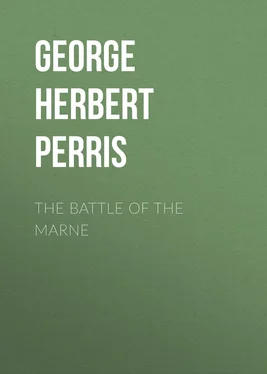George Herbert Perris - The Battle of the Marne
Здесь есть возможность читать онлайн «George Herbert Perris - The Battle of the Marne» — ознакомительный отрывок электронной книги совершенно бесплатно, а после прочтения отрывка купить полную версию. В некоторых случаях можно слушать аудио, скачать через торрент в формате fb2 и присутствует краткое содержание. Жанр: foreign_prose, foreign_antique, на английском языке. Описание произведения, (предисловие) а так же отзывы посетителей доступны на портале библиотеки ЛибКат.
- Название:The Battle of the Marne
- Автор:
- Жанр:
- Год:неизвестен
- ISBN:нет данных
- Рейтинг книги:5 / 5. Голосов: 1
-
Избранное:Добавить в избранное
- Отзывы:
-
Ваша оценка:
- 100
- 1
- 2
- 3
- 4
- 5
The Battle of the Marne: краткое содержание, описание и аннотация
Предлагаем к чтению аннотацию, описание, краткое содержание или предисловие (зависит от того, что написал сам автор книги «The Battle of the Marne»). Если вы не нашли необходимую информацию о книге — напишите в комментариях, мы постараемся отыскать её.
The Battle of the Marne — читать онлайн ознакомительный отрывок
Ниже представлен текст книги, разбитый по страницам. Система сохранения места последней прочитанной страницы, позволяет с удобством читать онлайн бесплатно книгу «The Battle of the Marne», без необходимости каждый раз заново искать на чём Вы остановились. Поставьте закладку, и сможете в любой момент перейти на страницу, на которой закончили чтение.
Интервал:
Закладка:
Those who have lived at the centre as well as on the skirts of armed hosts become habituated to one enveloping condition: the rank and file, and even most of the officers, know little or nothing of what is passing outside their own particular spheres. It is in the nature and necessity of military operations, especially at the beginning and in a phase of rapid movement, that it should be so. Perhaps it is also a necessity of the psychology of endurance. Of these republican armies, only a small minority of the men were old soldiers; most of them had all they could do to adapt themselves, day by day and hour by hour, to the new world of violence, squalor, and general unreason in which they were now prisoned. They had to learn to bear fatigue and pain such as they had never known; to overcome the spasm of fear that grips the stoutest heart in unaccustomed emergencies; to thrust the bayonet not into a sandbag, but into soft, quivering flesh, and draw it forth again; to obey men who were incompetent and stupid, as well as born leaders. The German heavy shells, aeroplanes, motor transport, the formidable entrenchments and fields of wire—gradually they recognised these and other elements of the invader’s superiority. Weaklings cried: “We are betrayed. It is 1870 over again.” What could the bravest reply? Letters were few and far between. Newspapers were never so barren. What was Paris doing? What were Russia and England doing? The retreating columns marched with downcast eyes, wrapped in a moody silence.
By what revolt of the spirit did these apparently broken men become, a fortnight later, the heroes of the Marne? The answer must be that they were not broken, but were passing through the sort of experience which, in a virile race, wakens the dull-minded to their utmost effort, blows away the last traces of laxity and false idealism, and, by setting above every other fear the fear of a ruined Fatherland, rallies the whole mass on the elementary ground of defence to the death. Voices, lying voices, had whispered that France was diseased, body and soul, that the Republic would surely die of its corruptions. We have since discovered the immeasurable strength of democratic communities. Then it was questioned by the few, unsuspected by the many. England and America, even more than France, had outgrown any sort of liking for war. To be driven back to that gross test was a profound surprise. For the quick, proud French mind to find itself suddenly in face of defeat and the threat of conquest was a second and severer shock. The long retreat gave it time to perceive that this calamity arose largely from its own errors, and to re-group its forces in a truer conception of the character of modern warfare. Even Joffre may not have clearly realised this need; great instincts count in the crisis of leadership equally with powerful reasoning. Amid the tramp-tramp of the weary, dust-blinded columns, by the night bivouacs, under the rain of shrapnel and the crash of high explosive, men of the most diverse condition and character, shedding old vanities and new alarms, came down step by cruel step to the fundamental honesty, unity, and resolution of our nature. The mirage of an easy victory vanished; in its place a finer idea rose and rose till the armies saw nothing else: France must live! I may die, or be doomed to a travesty of life; at any price, France must be saved.
So the steel was tempered for the supreme trial.
CHAPTER II
A TRAGEDY OF ERRORS
“Errors,” “vanities”? These words must be justified, however gently, however briefly. To regard the battle of the Marne without reference to the grievous beginnings that led to and shaped it would be to belittle and falsify a subject peculiarly demanding care for true perspective. The battle may be classed as negatively decisive in that it arrested the invasion long enough to enable the Allies to gain an equality of forces, and so to prevent a final German victory; it was only positively decisive in the larger sense that it re-created on a sounder base the military spirit and power of France, which alone among the Western Allies seriously counted in that emergency, and, by giving the army a new direction, the nation a new inspiration, made it possible for them to sustain the long struggle that was to follow. Perilous illusions, military as well as pacifist, were buried beside the Marne. A fashion of thought, a whole school of teaching was quietly sunk in its waters. The French mind rose to its full stature as the nature of the surprise into which it had fallen broke upon it.
This surprise was threefold. In the first place, the German plan of campaign was misconceived. That plan was grandiose in its simplicity. It rested upon a sound sense of the separation of the Allies: their geographical dispersion, which gave the aggressor the advantages famous in the career of Frederick the Great, as in that of Napoleon; the diversity of character, power, and interest within the Entente, which was, indeed, hardly more than an improvisation, without any sort of common organ, so far; its lack of unity not only in command but in military theory and practice generally. The first of these data indicated to the German Command the Frederician succession of swift offensives; the second narrowed the choice for the first effort, and suggested an after-work of political intrigue; the third had fortified Prussian pride and discipline with a daring strategy and an armament superior, in most respects, to anything the rest of the world had conceived to be possible. Which of the three great States, then, should be first struck down? The wildest Pan-Germanist could not reply “England,” in face of her overwhelming sea-power. So the British Empire, with the North Sea and Channel coasts, were, for the moment, ignored. Its internal problems, its peaceful, almost neutral, temper, its slow-mindedness in European affairs, were more regarded than the trivial military force which alone England could at once offer its friends. For speed was to be of the essence of the plan. Remained France and Russia; and here political as well as military calculations entered. The inchoate Empire of the East would, it was thought, be the slower in getting to its feet. Would a new Moscow expedition break its will for self-defence? The author of the “Willy-Nicky” letters imagined a better way. France would stand by her ally. The “Republic of the Rochettes and Steinheils,” however, was not naturally impregnable; when it was finished, would not “dear Nicky” be glad to return to the Drei-Kaiserbund, the old Bismarckian order, and to join in a friendly rearrangement of the world? So the conclusion, with all the neatness of a professorial thesis: Russia was to be held up—actively, on the south, by the Austro-Hungarian armies, passively on the north, by a screen of German troops—while France, as the principal enemy, was swiftly crushed. Thus far, there should have been no surprise.
It was otherwise with the plan of campaign itself, and there are details that will remain in question till all the archives are opened. Yet this now appears the only plan on which Germany could hope to bring an aggressive war to a successful issue. A repetition of the triumph of 1870 would not be enough, for, if France resisted as long this time, everything would be put in doubt. The blow must be still more swift and overwhelming. To be overwhelming, it must at once reach not portions, but the chief mass, of the French armies. But nowhere in the world had military art, working upon a favourable terrain, set up so formidable a series of obstacles to grand-scale manœuvre as along the line of the Meuse and Moselle Heights and the Vosges. A piercing of this line at the centre, between the fortified systems of Verdun–Toul on the north and Epinal–Belfort on the south, might be an important contributory operation; in itself it could not give a speedy decision. A mere diversion by Belgium, in aid of a main attack in Lorraine, would not materially alter this calculation. The full effects of surprise, most important of all factors in a short struggle, could only be expected where the adversary was least prepared, which was certainly across the north. These offensive considerations would be confirmed by a defensive consideration: German Lorraine, also, was so fortified and garrisoned as to be beyond serious fear of invasion. In neither direction could Alsace provide favourable conditions for a great offensive.
Читать дальшеИнтервал:
Закладка:
Похожие книги на «The Battle of the Marne»
Представляем Вашему вниманию похожие книги на «The Battle of the Marne» списком для выбора. Мы отобрали схожую по названию и смыслу литературу в надежде предоставить читателям больше вариантов отыскать новые, интересные, ещё непрочитанные произведения.
Обсуждение, отзывы о книге «The Battle of the Marne» и просто собственные мнения читателей. Оставьте ваши комментарии, напишите, что Вы думаете о произведении, его смысле или главных героях. Укажите что конкретно понравилось, а что нет, и почему Вы так считаете.










